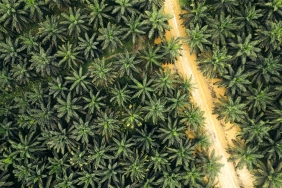ABOUT PALM OIL THAT MAKES YOU UPSET
It turns out that a lot of products outside of food are made using palm oil, such as shampoo, bar soap, detergent, toothpaste, and even lipstick. Who would have thought?
Palm oil can be used in various products because it has many superior properties. For example, as a vegetable oil, palm oil is the cheapest. Palm oil produces more oil than any other crop, the cost of production is also the least. In addition, palm oil is low in cholesterol and has a high carotene content. For cosmetics whose main component is oil, palm oil is chosen because it is safe for human skin. For heavy industry, palm oil can be used as a raw material for the manufacture of various oleochemical substances, which are then used as raw materials for various products such as paints, toothpaste, and plastics. Lately, palm oil has also begun to be looked at as a raw material for biodiesel.
Because of its many uses, the demand for palm oil is very high, which triggers the industry to continue to increase the quantity of production. Unfortunately, this has led to the destruction of forests, which has been disastrous for communities and wildlife alike.
Is it necessary to stop using products that contain palm oil?
Fortunately, the public does not need to go that far. But as consumers, they can force producers to produce products using palm oil in environmentally friendly ways. Join WWF in the #BuyGood campaign through change.org. This campaign aims to invite the public to actively encourage change, not only in the palm oil industry, but also in the pulp and paper, fishing and energy industries, to be more environmentally conscious. As consumers, people are invited to be more sensitive and conscientious about what they buy and consume. Is this product made in ways that do not harm the environment? Is this product good for health? These kinds of considerations should accompany the decision-making process when purchasing.
How do you know if a product is environmentally friendly?
Look at the packaging of the product to be purchased. Is there an RSPO (Roundtable Sustainable Palm Oil) label on the packaging of products that use palm oil? Is there an FSC (Forest Stewardship Council) label on the packaging of products that use wood as raw material? Products that have both labels are products that are made in ways that do not harm the environment. Especially the RSPO, which requires its members to implement zero burning practices, i.e. not clearing land or cultivating land using burning methods. The RSPO is strict in taking action against members who do not comply with the principles and criteria for sustainable palm oil production.
The public can use these two eco-labels as clues when choosing products. In the future, if consumers are always critical of what they buy and consume, producers will no longer be careless when making goods for consumption by the public.
WWF's target is that, by 2018, stores can already provide environmentally friendly products from palm oil, pulp and paper, seafood, and energy-efficient products as much as 10% of the total products in the store.
Let's take action now. Sign the pledge at https://www.change.org/p/saya-beliyangbaik-utk-selamatkan-bumi-ini-aksiku-mana-aksimu.





